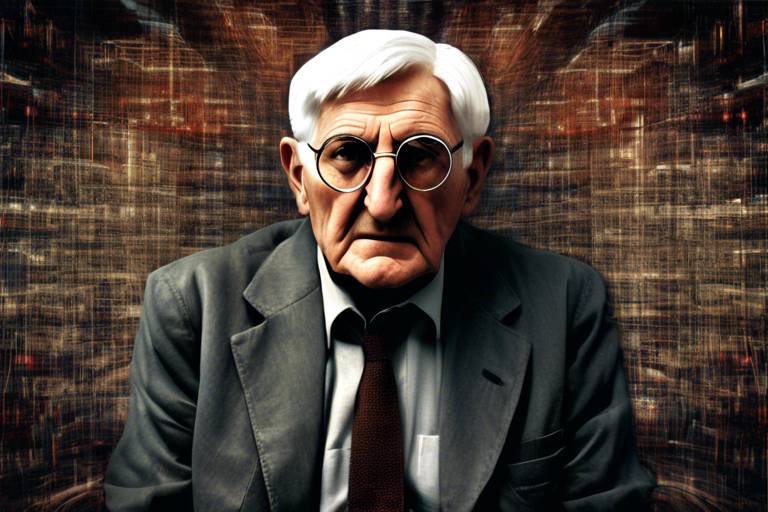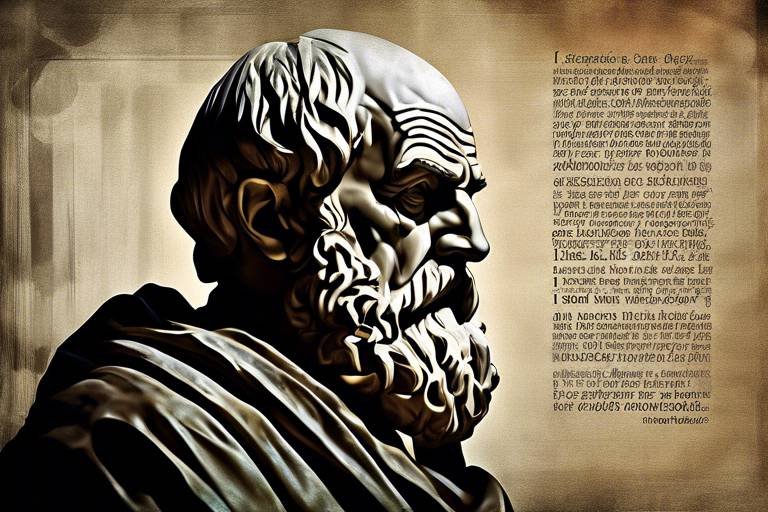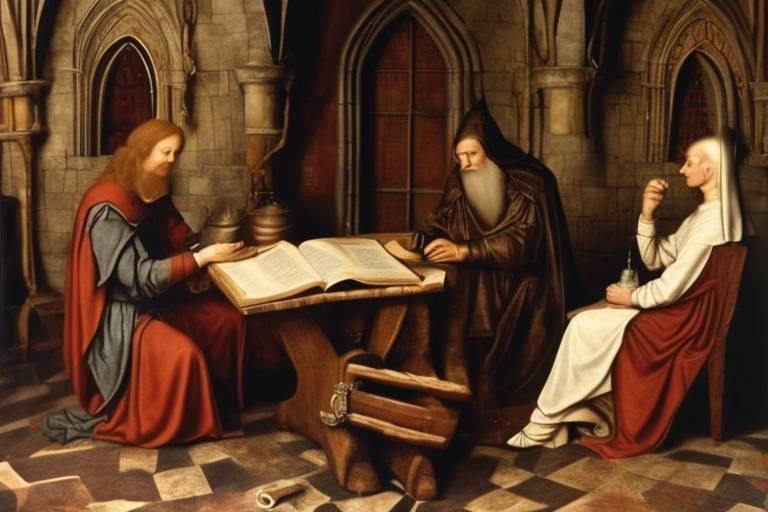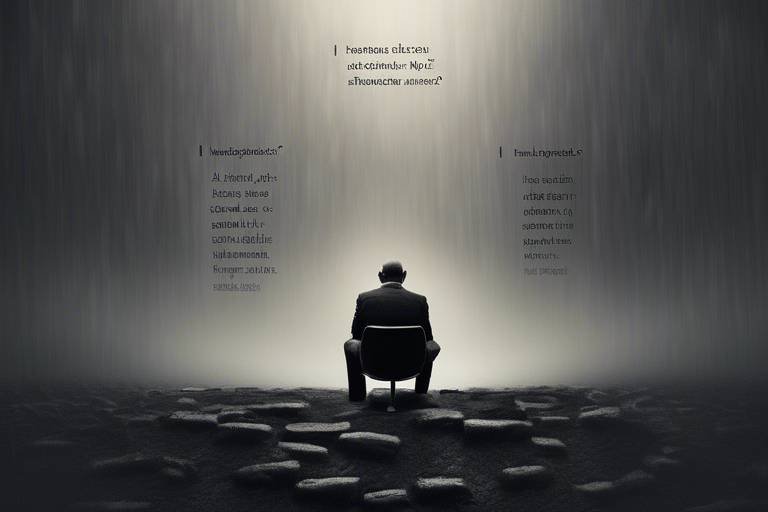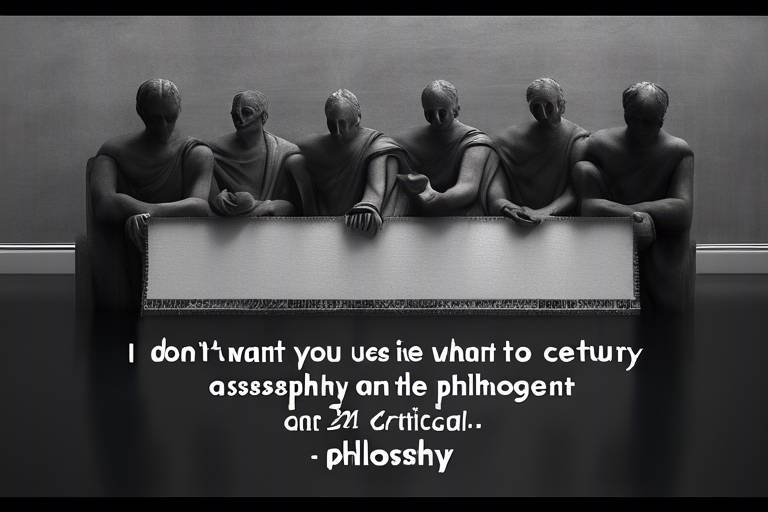Hegel and the Philosophy of History
When we think about the grand tapestry of history, it’s easy to see it as a mere collection of events, dates, and figures. But G.W.F. Hegel, one of the most influential philosophers of the 19th century, invites us to look deeper. He proposed that history is not just a series of random occurrences but rather a rational process that unfolds through a dialectical method. In this article, we’ll explore Hegel’s contributions to the philosophy of history, examining his key concepts, historical context, and the implications of his ideas for modern thought and historical interpretation.
To truly appreciate Hegel's philosophical ideas, we must first understand the vibrant historical backdrop against which he wrote. The 19th century was a time of immense change in Europe, characterized by the rise of nationalism, the Industrial Revolution, and significant political upheaval. The French Revolution had recently reshaped the political landscape, igniting debates about freedom, equality, and the role of the state. Hegel was influenced by these events, as well as the intellectual currents of his time, including Romanticism and German Idealism. These movements emphasized the importance of individual consciousness and the evolution of ideas, which would become central to Hegel's thought.
At the heart of Hegel's philosophy of history are several key concepts that help us understand his vision of historical development. One of the most significant of these is the dialectic, which serves as a framework for understanding the progression of ideas and societal structures. Hegel believed that history is driven by a dynamic process where contradictions arise, leading to their resolution through a synthesis of opposing forces. This unfolding of reason reflects the development of human consciousness and freedom, making history a rational process rather than a chaotic series of events.
The dialectical method is central to Hegel's philosophy, representing the process of thesis, antithesis, and synthesis. This triadic structure illustrates how conflicting ideas or forces can lead to the emergence of new, higher-level concepts. For instance, consider how the Enlightenment (thesis) challenged traditional authority (antithesis), ultimately leading to the modern democratic state (synthesis). This method not only applies to philosophical thought but also to historical development itself, suggesting that every epoch contains contradictions that propel it forward.
Each stage of the dialectic process contributes to the progression of history. The thesis represents an initial condition or idea, while the antithesis embodies a challenge or contradiction to that idea. The resolution of this conflict leads to the synthesis, which transcends and incorporates both previous stages. This cyclical process is crucial for understanding how societies evolve over time. For example, the clash between feudalism (thesis) and capitalism (antithesis) has led to the emergence of modern economic systems (synthesis), illustrating Hegel's belief that history is a rational process of development.
The implications of Hegel's dialectical method extend beyond philosophy into politics and culture. By applying this method, we can analyze contemporary issues through a historical lens, recognizing that current conflicts are often rooted in earlier struggles. This approach encourages a deeper understanding of societal changes and the evolution of ideas, fostering a more nuanced view of progress. For instance, the ongoing debates about social justice can be seen as a continuation of historical tensions between freedom and authority, illustrating how Hegel's ideas remain relevant today.
Another vital concept in Hegel's philosophy is the notion of the absolute spirit. Hegel viewed history as the unfolding of this absolute spirit, which represents the ultimate reality and rationality of the universe. As history progresses, human consciousness evolves, moving toward greater freedom and self-awareness. This idea suggests that history is not just a random sequence of events but a meaningful journey toward the realization of human potential. The evolution of consciousness, in Hegel's view, is intertwined with the development of societies and cultures throughout history.
Hegel's philosophy of history has had a profound impact on various fields, including political theory, sociology, and historiography. His ideas continue to shape contemporary discussions about the nature of history and the role of human agency in historical processes. Scholars and thinkers draw on Hegelian concepts to analyze modern issues, demonstrating the enduring relevance of his work. By understanding Hegel's contributions, we can better appreciate the complexities of our historical narrative and the philosophical underpinnings that guide our interpretation of the past.
While Hegel's contributions are significant, they have also faced criticism. Some argue that his dialectical method oversimplifies complex historical realities, reducing them to a linear progression. Critics from Marxism contend that Hegel's idealism neglects the material conditions that shape human experience. Similarly, existentialists challenge Hegel's emphasis on rationality, arguing that it overlooks the chaotic and unpredictable nature of human existence. These critiques highlight the ongoing debates surrounding Hegel's philosophy and its implications for understanding history.
Hegel's legacy endures in the realm of philosophy, influencing numerous thinkers and movements. From Marx to existentialists, Hegel's ideas have sparked rich discussions and debates that continue to resonate today. His vision of history as a rational process has shaped our understanding of societal evolution and the interplay between ideas and historical events. In contemporary philosophical discourse, Hegel's work remains a vital reference point, prompting us to reflect on the nature of history and our place within it.
- What is Hegel's dialectical method? Hegel's dialectical method involves a triadic process of thesis, antithesis, and synthesis, representing how conflicting ideas lead to the development of new concepts.
- How did Hegel influence modern thought? Hegel's ideas have shaped various fields, including political theory and sociology, providing a framework for understanding the progression of history and human consciousness.
- What are some critiques of Hegel's philosophy? Critics argue that Hegel's idealism oversimplifies historical complexities and neglects material conditions, leading to debates about the nature of history and human experience.

Hegel's Historical Context
To truly grasp Hegel's philosophy, it's essential to understand the historical backdrop that shaped his thoughts. Born in 1770 in Stuttgart, Germany, Hegel lived during a time of significant upheaval and transformation. The late 18th and early 19th centuries were marked by the French Revolution, the rise of nationalism, and the emergence of modern statehood. These events were not just political; they were deeply intertwined with the intellectual currents of the time, which included the Enlightenment's emphasis on reason and individual rights.
In this era, Europe was grappling with the remnants of feudalism while simultaneously experiencing the stirrings of industrialization. The social fabric was changing, and with it, the philosophical landscape. Thinkers like Kant and Fichte laid the groundwork for Hegel's ideas, emphasizing the role of the individual and the nature of consciousness. Hegel, however, took these notions further, proposing that history itself is a rational process driven by the unfolding of the Absolute Spirit.
Hegel's context was not just intellectual; it was also profoundly political. The Napoleonic Wars had a significant impact on German states, creating a sense of urgency and a desire for unity among the fragmented territories. This political climate influenced Hegel's view of history as a dialectical progression towards freedom and self-realization. He saw history as a narrative of the struggle for freedom, where each event contributed to the development of human consciousness and societal structures.
Moreover, the Romantic movement, which emphasized emotion and individual experience, also played a crucial role in shaping Hegel's philosophy. This movement was a reaction against the rationalism of the Enlightenment and sought to incorporate the irrational and the spiritual into understanding human life. Hegel synthesized these ideas, arguing that history is not merely a series of events but a dynamic process where the human spirit evolves through conflict and resolution.
In summary, understanding Hegel's historical context is vital for appreciating his contributions to the philosophy of history. The interplay of political, social, and intellectual currents in 19th-century Europe provided a rich tapestry against which Hegel crafted his ideas, making them not only a product of their time but also a profound commentary on the nature of human existence and progress.
- What influenced Hegel's philosophical ideas? Hegel's ideas were influenced by the Enlightenment, Romanticism, and the political upheaval of his time, particularly the French Revolution and the Napoleonic Wars.
- How does Hegel view history? Hegel views history as a rational process driven by the dialectical unfolding of the Absolute Spirit, where each event contributes to the development of human consciousness and freedom.
- What is the significance of the dialectical method in Hegel's philosophy? The dialectical method represents the process of thesis, antithesis, and synthesis, illustrating how conflicting ideas lead to progress and the evolution of thought and society.

Key Concepts in Hegel's Philosophy
When we dive into the depths of Hegel's philosophy, we encounter a rich tapestry of ideas that have shaped not only his own time but also the very fabric of modern thought. At the heart of Hegel's philosophy of history are several key concepts that illuminate his understanding of the world and its development. These concepts include the dialectic, absolute spirit, and the unfolding of reason. Each of these ideas plays a crucial role in how Hegel interprets history as a rational process, one that is constantly evolving and progressing.
The dialectical method is perhaps the most notable feature of Hegel's philosophy. It serves as a framework for understanding the dynamic interplay of opposing forces in the development of ideas and societal structures. Picture this: a conversation where two people hold opposing views. Through discussion, they challenge each other, leading to a new understanding that incorporates elements of both perspectives. This is the essence of Hegel's dialectic, often summarized in the triadic structure of thesis, antithesis, and synthesis. Each stage of this process contributes to the evolution of thought and history.
To grasp the dialectical method, one must recognize that it is not merely a philosophical tool but a lens through which we can view historical development. The thesis represents an initial idea or state of affairs; the antithesis presents a contradiction or challenge to that idea; and finally, the synthesis emerges as a resolution that transcends and incorporates both the thesis and antithesis. This cyclical process is not linear; rather, it is a spiral, constantly ascending to higher levels of understanding and realization.
Let's break down this triadic structure further. For instance, consider the historical progression of democracy. The thesis might be the absolute monarchy, which represents a centralized power structure. The antithesis could be the revolutionary movements that challenge this authority, advocating for individual rights and freedoms. The synthesis emerges when democratic principles are adopted, leading to a new political framework that balances authority with individual liberty. This example illustrates how each stage of the dialectic is essential for the development of ideas and societal structures.
The implications of Hegel's dialectical method extend far beyond the realm of philosophy. In politics, for instance, it provides a framework for understanding the evolution of political systems. In culture, it helps us comprehend how art and literature respond to and shape societal values. Hegel's dialectic encourages us to view history not as a series of isolated events but as an interconnected web of ideas and actions that influence one another. This holistic perspective is invaluable in contemporary discussions about social change and progress.
Another cornerstone of Hegel's philosophy is the concept of absolute spirit. For Hegel, history is not just a sequence of events; it is a rational process that reflects the unfolding of human consciousness and freedom. The absolute spirit represents the ultimate realization of human potential, where individuals achieve self-awareness and freedom through their participation in history. This notion challenges us to consider how our actions contribute to the larger narrative of humanity's quest for understanding and liberation.
In summary, Hegel's key concepts provide a profound framework for interpreting history. The dialectical method reveals the dynamic interplay of ideas and social structures, while the notion of absolute spirit emphasizes the rational progression of human consciousness. Together, these ideas compel us to rethink our understanding of history and our place within it, urging us to recognize that we are not merely passive observers but active participants in the unfolding story of humanity.
- What is Hegel's dialectical method? It is a framework for understanding the development of ideas through the stages of thesis, antithesis, and synthesis.
- How does the concept of absolute spirit relate to history? It posits that history reflects the unfolding of human consciousness and freedom, culminating in the realization of our potential.
- Why is Hegel's philosophy relevant today? Hegel's ideas continue to influence political theory, sociology, and historiography, providing insights into the interconnectedness of historical events.

The Dialectical Method
The dialectical method is not just a philosophical tool; it’s a profound way of understanding the evolution of ideas and history itself. At its core, this method is about the dynamic interplay between opposing forces, encapsulated in the triadic structure of thesis, antithesis, and synthesis. Imagine a dance where two partners, each with their own distinct styles, come together to create a new form of movement. This is how Hegel viewed the progress of history and thought—a continuous process of conflict and resolution.
Hegel believed that every idea, or thesis, inevitably encounters its opposite, the antithesis. This clash is not merely a struggle; it is a necessary conflict that propels development. For instance, consider the idea of freedom. The thesis of individual freedom might clash with societal norms (the antithesis). This conflict leads to a synthesis, where a new understanding of freedom emerges that incorporates both individual rights and social responsibilities. This synthesis then becomes the new thesis, and the cycle continues. It’s like a never-ending spiral, where each revolution brings us closer to a more profound understanding of truth.
To illustrate this further, let’s break down the dialectical process:
| Stage | Description |
|---|---|
| Thesis | The initial idea or state of affairs. |
| Antithesis | The opposing idea that challenges the thesis. |
| Synthesis | The resolution that reconciles the thesis and antithesis, leading to a new thesis. |
What’s fascinating about the dialectical method is its application beyond mere philosophy. It extends into the realms of politics, culture, and even personal development. For example, in political discourse, opposing ideologies clash, leading to new policies and social structures that reflect a synthesis of those ideas. This method encourages us to embrace conflict as a catalyst for growth rather than viewing it as a negative force.
However, it’s essential to recognize that the dialectical method does not imply a linear progression. History is not just a straight line moving from one idea to another; it’s more like a complex web of interactions, where multiple dialectical processes occur simultaneously. This complexity is what makes history so rich and nuanced. By understanding these interactions, we can better appreciate the intricate tapestry of human experience.
In summary, the dialectical method serves as a powerful lens through which we can view the unfolding of history and ideas. It invites us to question, engage, and evolve rather than settle for static understandings. As we navigate our own lives, embracing this method can help us confront challenges, learn from contradictions, and ultimately synthesize new perspectives that propel us forward. So, the next time you find yourself in a debate or facing a dilemma, remember: it’s not just about winning or losing; it’s about finding that new ground where understanding can flourish.
- What is the dialectical method? The dialectical method is a philosophical framework that involves the resolution of contradictions through a process of thesis, antithesis, and synthesis.
- How does the dialectical method apply to history? It helps us understand how conflicting ideas and events shape historical development by leading to new understandings and societal changes.
- Can the dialectical method be applied in everyday life? Absolutely! It encourages us to embrace conflicts and contradictions in our lives as opportunities for growth and new insights.

Thesis, Antithesis, and Synthesis
The dialectical process of thesis, antithesis, and synthesis is a cornerstone of Hegel's philosophy, acting as a dynamic framework through which history unfolds. Imagine a conversation where two people hold opposing views; the clash of their ideas sparks a deeper understanding, leading to a new perspective that incorporates elements from both sides. This is the essence of Hegel's dialectic, a method that illustrates how contradictions and conflicts drive progress in both thought and society.
At the heart of this process lies the thesis, which represents an initial idea or state of affairs. However, as history progresses, this thesis inevitably encounters its antithesis—a counterargument or opposing force that challenges its validity. Think of it like a debate where one side argues passionately for a particular viewpoint, while the other presents compelling reasons against it. The tension between these two forces is not merely destructive; instead, it serves as a catalyst for growth.
As the conflict between thesis and antithesis intensifies, a resolution emerges in the form of synthesis. This synthesis transcends the limitations of both the initial thesis and its antithesis, creating a new idea or state of affairs that incorporates aspects of both. It’s akin to a phoenix rising from the ashes, representing not just a compromise, but a higher level of understanding that propels society forward. In this way, history is not a linear progression but a spiral of development, where each cycle of conflict and resolution leads to greater complexity and depth.
The implications of this process are profound. For instance, consider the evolution of political systems. A traditional monarchy (thesis) may face a revolution (antithesis), resulting in a democratic government (synthesis). This new system, however, will eventually face its own challenges, leading to further evolution. Thus, the dialectical method reveals the fluidity of history, emphasizing that change is not just possible but inevitable.
In summary, the dialectical triad of thesis, antithesis, and synthesis not only explains how ideas evolve but also reflects the inherent contradictions within society. By embracing this dynamic process, we can better understand the complexities of historical development and the ongoing journey of human consciousness. It invites us to recognize that every conflict has the potential to foster growth, urging us to engage with opposing views rather than shy away from them.
- What is the significance of Hegel's dialectical method? Hegel's dialectical method is significant because it illustrates how contradictions drive historical development and the evolution of ideas.
- How does the dialectic apply to modern society? The dialectic applies to modern society by showing that conflicts and opposing viewpoints can lead to progress and new understandings.
- Can the dialectical method be observed in political changes? Yes, the dialectical method can often be observed in political changes, where established systems face challenges that lead to new forms of governance.

Implications of the Dialectical Method
The implications of Hegel's dialectical method extend far beyond the realm of philosophy, weaving their way into the very fabric of politics, culture, and social thought. At its core, the dialectical method suggests that history is not a linear progression but rather a complex interplay of conflicting ideas and forces. This perspective invites us to reconsider how we understand progress and development in society. For instance, when we look at historical events, we can see them not just as isolated incidents but as part of a larger narrative where each conflict leads to a resolution that incorporates elements of both sides. This is where the beauty of Hegel's thought lies; it encourages us to embrace contradictions as essential components of growth.
In practical terms, this means that political movements, social changes, and even cultural shifts can be viewed through a dialectical lens. By recognizing the thesis (the prevailing idea), antithesis (the opposing idea), and synthesis (the resolution), we can better understand how societies evolve. For example, consider the civil rights movement in the United States. The thesis might represent the status quo of segregation and inequality, while the antithesis embodies the push for equality and justice. The synthesis emerges as new laws and societal norms that reflect a more inclusive understanding of rights. This process is ongoing, highlighting that history is dynamic and ever-changing.
Moreover, Hegel's dialectical method encourages critical thinking and philosophical inquiry. It compels individuals to question established norms and consider alternative viewpoints, fostering an environment where dialogue and debate can flourish. In educational contexts, this method can stimulate deeper understanding among students, prompting them to engage with multiple perspectives rather than accepting information at face value. This approach not only enriches their learning experience but also prepares them to navigate the complexities of the modern world.
However, the implications of the dialectical method are not without controversy. Critics argue that Hegel's framework can lead to determinism, suggesting that history unfolds in a preordained manner. Yet, proponents counter that the dialectical method actually emphasizes human agency within historical processes. It acknowledges that while larger forces shape history, individuals and groups still play a crucial role in driving change. This tension between determinism and agency continues to spark debate among scholars and thinkers today.
In summary, the implications of Hegel's dialectical method are profound and multifaceted. By viewing history as a dynamic interplay of ideas, we gain valuable insights into the nature of progress and the complexities of human experience. This framework not only enriches our understanding of the past but also equips us to engage with the present and future in a more thoughtful and critical manner.
- What is the dialectical method? The dialectical method is a philosophical approach that involves the resolution of contradictions through a process of thesis, antithesis, and synthesis.
- How does Hegel's dialectical method apply to history? Hegel's method suggests that historical development occurs through conflicts of ideas, leading to new understandings and societal changes.
- What are some criticisms of Hegel's philosophy? Critics argue that his philosophy can lead to determinism and that it may overlook the role of individual agency in shaping history.
- How can the dialectical method be used in education? The dialectical method encourages critical thinking by prompting students to explore multiple perspectives and engage in meaningful discussions.

Absolute Spirit and History
The concept of absolute spirit is a cornerstone in Hegel's philosophy, serving as a lens through which we can understand history as a rational and progressive process. According to Hegel, absolute spirit represents the culmination of human consciousness, where individual self-awareness merges with universal spirit. This idea suggests that history is not just a series of random events but rather a coherent narrative that reflects the unfolding of human freedom and rationality.
To grasp the essence of absolute spirit, we must consider its three main manifestations: art, religion, and philosophy. Each of these forms represents a different way in which human beings express and understand their relationship to the world and the divine. Let's break this down:
| Manifestation | Description |
|---|---|
| Art | Art captures the emotional and sensory aspects of human experience, serving as a bridge between the individual and the universal. |
| Religion | Religion provides a framework for understanding the divine and moral order, reflecting humanity's quest for meaning and connection. |
| Philosophy | Philosophy represents the highest form of understanding, where reason and thought seek to comprehend the entirety of existence. |
In Hegel's view, these manifestations are not isolated; rather, they interact and evolve over time, illustrating the dynamic nature of historical development. As absolute spirit unfolds, it signifies the increasing realization of human freedom and the capacity for self-determination. Hegel posits that history is essentially the story of humanity's journey toward greater understanding and liberation.
Moreover, the evolution of absolute spirit is intricately linked to the progress of consciousness throughout history. As societies advance, their collective consciousness expands, leading to more sophisticated forms of self-awareness and social organization. This progression can be seen in the development of political systems, cultural norms, and philosophical ideas that reflect the shifting understanding of freedom and individuality.
One of the most fascinating aspects of Hegel's view on absolute spirit is how it challenges us to reconsider our understanding of history. Instead of seeing history as a mere collection of facts or events, Hegel encourages us to view it as a rational process, where each moment is a necessary step in the unfolding of human potential. This perspective invites us to ask profound questions about our place in the world and the direction of our collective journey.
In conclusion, Hegel's concept of absolute spirit offers a rich framework for interpreting history, emphasizing the interconnectedness of human experience and the ongoing quest for freedom and understanding. By recognizing the significance of absolute spirit, we can appreciate the deeper meanings behind historical events and the evolution of human thought.
- What is absolute spirit in Hegel's philosophy? Absolute spirit refers to the highest form of human consciousness and understanding, manifesting through art, religion, and philosophy.
- How does Hegel view history? Hegel sees history as a rational process that reflects the unfolding of human freedom and the development of consciousness.
- Why is the dialectical method important in Hegel's philosophy? The dialectical method illustrates how opposing ideas (thesis and antithesis) interact to create new understandings (synthesis), driving historical progress.
- What are the implications of Hegel's ideas for modern thought? Hegel's philosophy influences contemporary discussions in various fields, including political theory, sociology, and historiography, shaping our understanding of history and society.

Hegel's Influence on Modern Thought
Hegel's impact on modern thought is nothing short of revolutionary. His ideas have permeated various fields, reshaping the way we understand not only history but also politics, sociology, and even our own consciousness. To grasp the full extent of Hegel's influence, it’s essential to recognize how his dialectical method and concepts like absolute spirit have inspired a multitude of thinkers and movements.
In the realm of political theory, Hegel's ideas laid the groundwork for numerous philosophies that followed. His notion of the state as the embodiment of ethical life has been pivotal for both conservative and progressive political thought. For instance, while Karl Marx critiqued Hegel’s idealism, he simultaneously adopted the dialectical method to formulate his own theories on class struggle and historical materialism. This synthesis of Hegel’s ideas and Marx’s critiques has created a rich tapestry of political discourse that continues to evolve today.
Moreover, Hegel’s influence extends into sociology. Thinkers like Georg Simmel and Max Weber drew on Hegelian concepts to explore social dynamics and the development of individual consciousness within society. Hegel's emphasis on the importance of historical context in shaping human experience resonates strongly in contemporary sociological studies, where understanding the interconnections between societal structures and individual agency is crucial.
In the field of historiography, Hegel's philosophy has prompted historians to consider the broader implications of historical events. His view that history is a rational process, unfolding through the dialectical progression of ideas, encourages historians to look beyond mere chronology. Instead, they are urged to analyze the underlying forces and ideas that drive historical change. This perspective has led to a more nuanced understanding of events, prompting historians to ask not just what happened, but why it matters in the grand scheme of human development.
Interestingly, Hegel's ideas have also found their way into contemporary philosophy, influencing existentialists like Jean-Paul Sartre and postmodern thinkers. While these philosophers may diverge significantly from Hegel's original ideas, they often engage with his concepts, either by building on them or by positioning their own thoughts in contrast. This ongoing dialogue highlights the enduring relevance of Hegelian philosophy in addressing modern existential questions and the nature of reality.
To summarize, Hegel's influence on modern thought is profound and multifaceted. His ideas have ignited debates, inspired new philosophies, and encouraged generations of thinkers to explore the intricate relationships between history, society, and individual consciousness. By examining the implications of his work, we gain insight into the complexities of modern existence and the philosophical inquiries that continue to shape our world.
- What is Hegel's dialectical method? Hegel's dialectical method involves a triadic structure of thesis, antithesis, and synthesis, representing the progression of ideas through conflict and resolution.
- How did Hegel influence Marx? Hegel's dialectical approach inspired Marx to develop his own theories on class struggle, although Marx critiqued Hegel's idealism in favor of materialism.
- What is the significance of absolute spirit in Hegel's philosophy? Absolute spirit represents the culmination of human consciousness and freedom, illustrating how history unfolds rationally towards greater self-awareness.
- How does Hegel's philosophy relate to modern sociology? Hegel's ideas encourage sociologists to explore the interplay between societal structures and individual agency, emphasizing the historical context of social phenomena.

Critiques of Hegel's Philosophy
Hegel's philosophy, while groundbreaking and influential, has not been without its fair share of critiques. Many thinkers have engaged with his ideas, offering various perspectives that challenge his conclusions and methodologies. One of the most significant critiques comes from the realm of Marxism. Karl Marx, who was initially influenced by Hegel, later diverged from his ideas, particularly criticizing Hegel's idealism. Marx argued that Hegel placed too much emphasis on abstract ideas and not enough on the material conditions that shape human existence. In Marx's view, history is driven by economic factors and class struggles, rather than the unfolding of an absolute spirit or rational process as Hegel proposed.
Another notable critique arises from the existentialist perspective, particularly from thinkers like Søren Kierkegaard. Kierkegaard contended that Hegel's philosophy neglects the individual's subjective experience and emotional depth. He believed that Hegel's systematic approach oversimplifies the complexities of human existence, reducing it to mere logical constructs. For Kierkegaard, the essence of being human lies in the personal struggle, choice, and the leap of faith that cannot be fully captured by Hegel's dialectical method.
Moreover, contemporary philosophers have raised concerns regarding Hegel's historical determinism. Critics argue that his view suggests a predetermined progression of history, which can undermine the role of individual agency and the unpredictability of human actions. This perspective raises questions about the validity of Hegel's claim that history unfolds in a rational manner, leading humanity toward greater freedom and self-realization.
In addition to these philosophical critiques, Hegel's work has also faced challenges from feminist scholars. They argue that Hegel's framework is inherently patriarchal, often sidelining women's experiences and contributions to history. This critique highlights the need to re-examine historical narratives through a more inclusive lens, recognizing the diverse voices that have shaped societal developments.
Despite these critiques, Hegel's influence remains pervasive across various fields. His ideas continue to spark debate and inspire new interpretations, showcasing the dynamic nature of philosophical discourse. The criticisms not only underscore the limitations of Hegel's thought but also invite deeper exploration into the complexities of history, consciousness, and human experience.
- What is the main critique of Hegel's philosophy? The primary critiques of Hegel's philosophy center around his idealism, historical determinism, and neglect of individual agency, as articulated by thinkers like Marx and Kierkegaard.
- How did Marx differ from Hegel? Marx diverged from Hegel by emphasizing material conditions and class struggles as the driving forces of history, rather than abstract ideas or an absolute spirit.
- What do feminist critiques of Hegel focus on? Feminist critiques highlight Hegel's patriarchal framework and the exclusion of women's experiences from his historical narrative, advocating for a more inclusive approach to history.

Hegel's Legacy in Philosophy
Hegel's legacy in the realm of philosophy is nothing short of monumental. His ideas have not only shaped the landscape of 19th-century thought but have also reverberated through the corridors of modern philosophy, influencing countless thinkers and movements. To grasp the full impact of Hegel's contributions, we must consider the various ways in which his philosophy has been interpreted and adapted over time. From existentialism to Marxism, and even contemporary political theory, Hegel's dialectical method and notions of absolute spirit have provided fertile ground for philosophical exploration.
One of the most significant aspects of Hegel's legacy is his profound influence on existentialists like Jean-Paul Sartre and Martin Heidegger. These thinkers grappled with Hegelian concepts, particularly the idea of self-consciousness and the nature of freedom. For instance, existentialists often critique Hegel's emphasis on the collective spirit, proposing instead that individual existence and subjective experience are paramount. This tension between Hegel's collective rationality and existentialist individualism showcases the dynamic interplay of ideas that Hegel's philosophy inspires.
Moreover, Hegel's dialectical method has been pivotal in shaping Marxist thought. Karl Marx adopted and adapted Hegel's dialectics to develop his materialist conception of history, arguing that the material conditions of life drive historical change rather than the unfolding of absolute spirit. This transformation of Hegel's ideas into a critique of capitalism illustrates how Hegel's legacy is not static but rather a living dialogue that continues to evolve.
In addition to existentialism and Marxism, Hegel's philosophy has made significant inroads into contemporary political theory. His ideas about the state, freedom, and ethical life have influenced modern discussions about democracy and civil society. Thinkers like Alexis de Tocqueville and John Stuart Mill have engaged with Hegelian concepts, examining the relationship between individual freedom and societal structures. This ongoing engagement highlights the relevance of Hegel's thought in navigating the complexities of modern governance and social organization.
Furthermore, Hegel's impact extends into the realm of historiography, where his dialectical approach has informed how historians understand and interpret the past. The idea that history is a rational process, unfolding through contradictions and resolutions, encourages historians to look beyond mere events and dates. Instead, they are prompted to seek out the underlying forces that shape historical narratives. This perspective has led to richer, more nuanced interpretations of history, emphasizing the interconnectedness of events and ideas.
In summary, Hegel's legacy is characterized by a dynamic interplay of ideas that continues to resonate across various fields of thought. His contributions have sparked debates, inspired new movements, and challenged subsequent generations to rethink the nature of history, freedom, and consciousness. As we navigate the complexities of contemporary philosophy, the echoes of Hegel's thought remind us that the journey of understanding is ongoing, and that each generation must grapple with the questions he raised. In this way, Hegel remains not just a historical figure but a vital part of the philosophical conversation today.
- What is Hegel's dialectical method? Hegel's dialectical method is a process of development that involves a triadic structure: thesis, antithesis, and synthesis. This method illustrates how contradictions in thought and reality lead to the evolution of ideas and societal change.
- How did Hegel influence Marxism? Hegel's ideas were adapted by Karl Marx, who transformed Hegel's dialectics into a materialist framework, arguing that material conditions, rather than abstract ideas, drive historical change.
- What is the significance of absolute spirit in Hegel's philosophy? Absolute spirit represents the culmination of human consciousness and freedom in Hegel's philosophy. It signifies the rational process of history, where human freedom unfolds through self-realization and cultural development.
- How is Hegel relevant to contemporary philosophy? Hegel's ideas continue to influence modern philosophical discussions in various fields, including political theory, sociology, and historiography, prompting ongoing debates about freedom, history, and the nature of reality.
Frequently Asked Questions
- What is Hegel's philosophy of history?
Hegel's philosophy of history is a framework that views history as a rational process driven by the unfolding of human consciousness and freedom. He posits that history progresses through a dialectical method, where conflicts and contradictions lead to new developments.
- How does the dialectical method work in Hegel's philosophy?
The dialectical method consists of three stages: thesis, antithesis, and synthesis. In this process, an initial idea (thesis) encounters its opposition (antithesis), and through their conflict, a new understanding (synthesis) emerges. This cycle repeats, driving historical progress and the evolution of thought.
- What is the significance of the concept of absolute spirit?
Absolute spirit is a key concept in Hegel's philosophy, representing the ultimate reality and the culmination of human consciousness. It signifies the idea that history is not random but a rational unfolding where human freedom and self-awareness develop over time, culminating in a higher understanding of existence.
- How has Hegel influenced modern thought?
Hegel's ideas have significantly shaped various fields, including political theory, sociology, and historiography. Thinkers like Marx and existentialists have engaged with Hegelian concepts, either building upon or critiquing them, which has led to rich discussions in contemporary philosophy.
- What are some critiques of Hegel's philosophy?
Critiques of Hegel's philosophy often stem from its perceived idealism and complexity. Marxists argue that Hegel's focus on ideas overlooks material conditions, while existentialists challenge his emphasis on rationality, advocating for individual experience and freedom instead.
- Why is Hegel's legacy important in philosophy?
Hegel's legacy is crucial because it has influenced numerous philosophical movements, including German idealism, existentialism, and Marxism. His dialectical method and concepts of freedom and consciousness continue to resonate, prompting ongoing debates about the nature of history and human development.




